Escape rooms have become quite the trend in the real world lately. We keep meaning to get out and enjoy one (especially since Escape Alaska is in town). But until we find the time, one of my favorite ways to experience something similar is with the Unlock series. Using the assistance of an app to run some of the background and different cards players follow an unique story filled with puzzles and codes.
The Platypus game library has a small section devoted to escape room type games. Currently that section has six different Unlock adventures. Our favorite, especially for new people, is Squeak & Sausage. It is just the right mix of humor, puzzles, hidden numbers, and codes.
While most of the posts in the Top 100 have talked a lot about gameplay, we definitely have to be more careful with these titles as spoilers are a thing. The games can only be played once as after that you will know all of the answers and be able to just blow through the adventure. The games are pretty inexpensive, so if you don’t have the chance to play them for free from our library then you can still have some cheap fun with a group of friends as games all last around an hour.
In general the game is played by putting cards with blue numbers together with red numbers. The sum of those cards will hopefully be a good card in the deck (Some cards are penalties). If you find the right card then it will lead you to other riddles and puzzles. Occasionally you will come across a yellow card and those generally require a code to be entered into the app. The source of the codes will vary widely through the different games from obvious to real brain burners.
With Unlock being our favorite escape room simulator it is the highest one on the Top 100 but if after you have played through them you are looking forward to more (just like we are) then you should give the rest of our Escape Room games a try! We have some named very originally as “Escape Room the game” to another series of games that doesn’t use an app called Deckscape. In the end though we definitely suggest the Unlock series most of all since it is the one we placed on as the #67 on our Top 100.




















